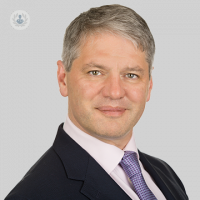How to stop varicose veins from coming back
Escrito por:Varicose veins recurrence is extremely common and can be frustrating if you've spent considerable money on treatment. Although it can't always be prevented, there are many steps a clinic can take in the original procedure to reduce your chances of recurrence as much as possible. In this article celebrated vascular surgeon Professor Mark Whiteley explains these steps and what patients should look for in a quality clinic.

It is extremely frustrating to see varicose veins return after you’ve had treatment for them. Some studies suggest that varicose veins return in up to 60% of patients after 5 years.
One major factor is your genetics – you can’t stop varicose veins developing in the first place, and over time it is likely that more will develop. But the risk of getting new varicose veins this way is only around 3 – 4.5% a year. Many more cases of recurrence are the result of inadequate diagnosis and treatment.
With so many clinics offering varicose vein surgery, it’s important to know what to look for in a good quality clinic. Here is some advice:
Get a thorough scan
Properly scanning the veins in your legs takes time. A 10-minute ultrasound scan is not enough, and if a clinic is offering this, look elsewhere. A proper scan which identifies all of the veins in the legs can take up to 45 minutes.
A full scan is important so that all abnormal veins are detected and treated in the first instance. It’s also vital for identifying the root cause of the problem. The veins you see on the surface are often the result of the problem, not the cause. The secondary causes of varicose veins can be much more subtle – and a quick scan is likely to miss them.
A cheap ultrasound scan is a false economy – it can put you in a situation where you need treatment to be repeated. Avoid the extra cost by getting a proper investigation the first time round.
Make sure the pelvic veins are investigated
For 1 in 7 women, pelvic varicose veins are the major cause of the leg varicose veins. If only the leg veins are treated, the root of the problem remains – and the varicose veins in the leg will return. If the consultant suspects that you might have pelvic vein reflux, you should be offered a full pelvic scan as part of the investigation process.
Avoid “vein stripping”
Vein stripping is an older form of treatment which involves cutting, stripping, and then tying off the abnormal veins. The problem with this treatment is that the body will attempt to grow the vein back, but this time the vein will grow with no valves at all.
For this reason, vein stripping is no longer recommended and most clinics instead offer less invasive treatments with greater success rates, such as foam sclerotherapy or laser ablation. These techniques work by killing the vein and tricking the body into eating it away, without any future regrowth.
Make sure treatment is personalised to you
No two people present with the same situation. The size and location of the veins will vary, and so will the treatment required. Many incidences of varicose veins recurrence are the result of unsuitable treatment decisions, such as the use of foam sclerotherapy in a vein of the wrong size, or the wrong power setting used in a laser ablation treatment.
Be wary of clinics offering one-size-fits-all treatments. What matter is not whether the treatment offered is the newest or the most high-tech, but whether it has been considered in light of your own circumstances and deemed the best option.
Varicose veins are difficult to live with, and most of us want the peace of mind that they have been treated effectively with the lowest risk of recurrence possible. The Whiteley Clinic has a dedicated programme of continual research and development into what works in varicose veins treatments, and all patients are guaranteed treatment in adherence to The Whiteley Protocol®. To find out more or book a consultation, click here.


